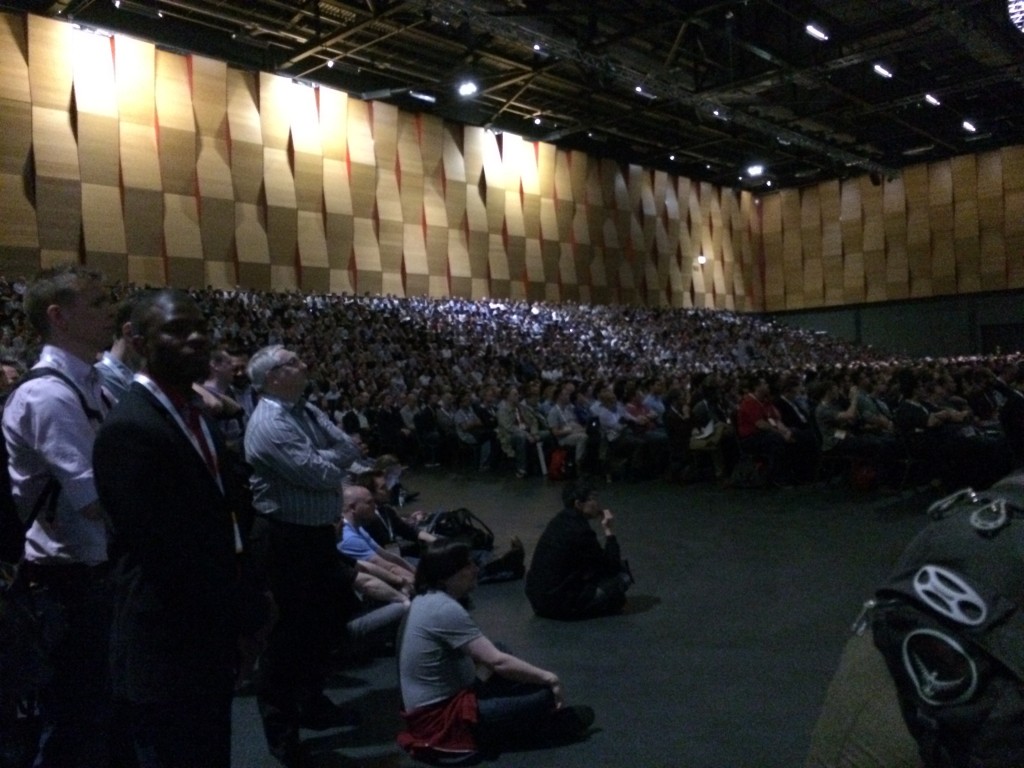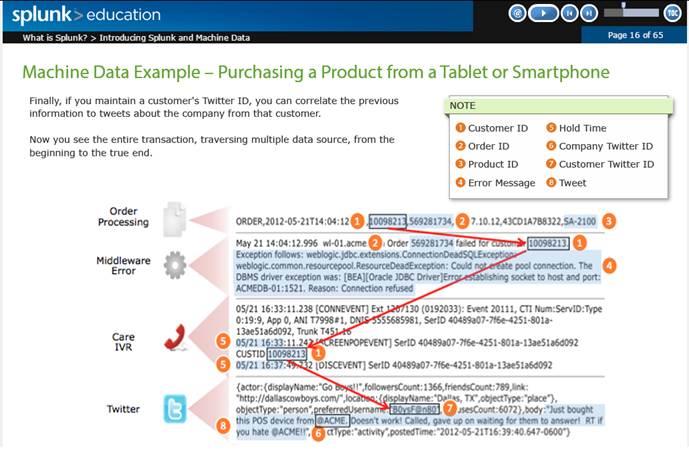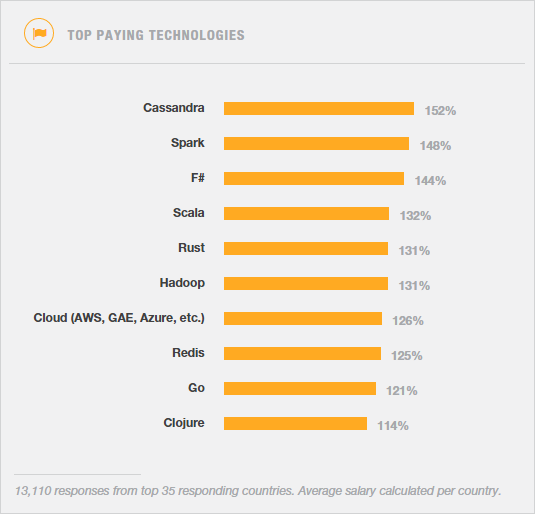Sections
Artificial Super Intelligence
[avatar user=”malm” size=”small” align=”left” link=”file” /]
As Moore’s Law hit a half century anniversary, the Economist chose to reflect on the longest running prediction in tech, namely the doubling of processor performance every 18 months. This exponent has been the fundamental driver behind a 50-year digital revolution:
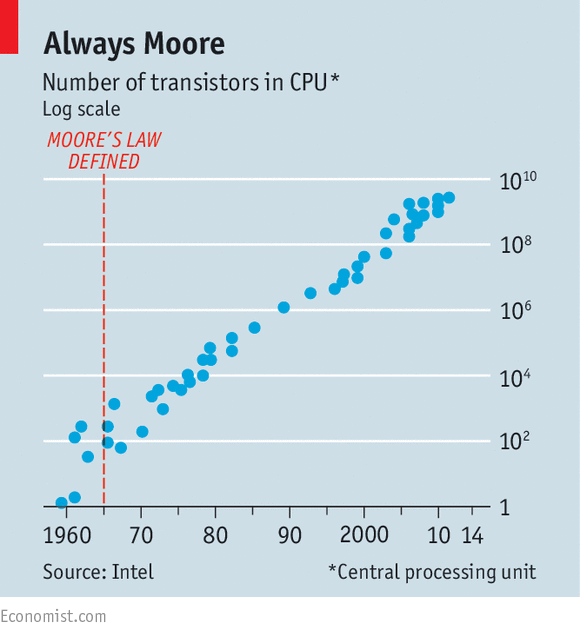
Looming large over any discussion of Moore’s Law is its application to the domain of artificial intelligence. Exponentiation of computing capability has resulted in huge advances in narrow AI (or ANI) across a very wide range of disciplines and forced us to contemplate AI eventually attaining then surpassing general human intelligence. Specialists in the field broadly concur that this so-called Singularity will happen at some point in the next 50 years. It’s still relatively common to encounter Singularity utopians that inhabit Confident Corner and therefore welcome the prospect:
“People should sit down, take off their shoes, pour themselves a drink and relax, because AI is safe for human consumption and will remain so for the foreseeable future.”
The majority view, however, as expressed by commentators from Bill Gates and Stephen Hawking to Elon Musk is much less Panglossian and more Anxious Avenue. They have serious concerns about the geometric progression of ANI to something approaching human-level general intelligence (or AGI). These observers are well aware that any such creation will rapidly cascade far beyond our comprehension horizon into artificial super-intelligence (or ASI). By definition we cannot predict what that will mean for humanity but it probably won’t involve cocktails:

Few ordinary people spend too much time thinking about what the dawn of ASI will mean for humanity. Someone who does is Tim Urban of WaitButWhy.com who earlier this year took his readers on an epic must-read journey which ends up in the realm of eschatology. When ASI arrives it will be capable of harnessing nanotech enablers to conjure up literally anything in the universe. The likely end result for humanity are one of two diametrically opposed outcomes – extinction or immortality.

That profound conclusion along with many other mind-bending observations await curious readers willing to spend the effort staying with Urban through an uncompromisingly long read. Suffice to say his description of how it may happen sounds all too plausible – the precautionary principle trampled upon in the rush to be first to market with an MVP AGI…:
“The especially troubling thing about this large and varied group of parties working on AI is that they tend to be racing ahead at top speed—as they develop smarter and smarter ANI systems, they want to beat their competitors to the punch as they go. The most ambitious parties are moving even faster, consumed with dreams of the money and awards and power and fame they know will come if they can be the first to get to AGI. And when you’re sprinting as fast as you can, there’s not much time to stop and ponder the dangers. On the contrary, what they’re probably doing is programming their early systems with a very simple, reductionist goal to just “get the AI to work.” Down the road, once they’ve figured out how to build a strong level of intelligence in a computer, they figure they can always go back and revise the goal with safety in mind. Right…?”
Devices and Manufacturers
- Xiaomi broke a Guinness World Record with 2.12 million handset sales not to mention many 100 thousands of smart appliances during their 12 hour “Mi Fan” online self-promoted sale this week. It’s testament to their status as an iconic lifestyle brand in China which has powered their extraordinary rise to a position among the top 3 global smartphone vendors. Remarkably enough, they could have sold even more products if it weren’t for the impact of fakes. Xiaomi is increasingly the target of China’s notorious smartphone cloners and their impact was explicitly acknowledged by CEO Lei Jun in a post-event press conference:
“What is the biggest problem? There are many fakes. If there were no counterfeits, our sales would be double or triple. The product has been recognized by everyone.”

- Walt Mossberg’s recent interview with Xiaomi President Bin Lin covered similar territory and revealed an ambition to create an innovative mobile wallet proposition. Mossberg has gone on to make a prediction that the “next Samsung” will emanate from the unique tech ecosystem in China. Furthermore that its advent is perhaps only a few years hence when it will have a profound impact on perceptions of Western tech hegemony:
“A Chinese company developing its own consumer tech products in a major category, at a level that competes with successful brands in the West. … This would represent a major new step in the evolution of Chinese consumer tech. Many Americans know that their smartphones, tablets and laptops are assembled in giant factory complexes in China. But these products are U.S.-branded and designed. A lot fewer know that there are a bunch of Chinese-designed and branded smartphones, but that these are largely crafted for and sold into the massive Chinese domestic market.”
- One way in which China is different is highlighted in this post which suggests a far greater inclination on the part of ordinary users to root their smartphones to improve them. Still, the figure of 80% seems far too high to be representative of the overall install base.

- Meanwhile Samsung’s own road to global consumer electronics giant status and their complex 50-year internecine rivalry with fellow South Korean chaebol (conglomerate) LG are recounted in this interesting CNET post.
- Once Nokia too were a dominant global player. After a disastrous few years culminating in the sale of their mobile unit, the company announced this week that they have finalised a deal to acquire Alcatel-Lucent for $16.6 billion. The merged entity centred in the EU will own a formidable combination of IP and will include the legendary Bell Labs among its assets. It’s perhaps Nokia’s best chance at a second coming albeit in a B2B arena far removed from its past consumer-oriented glories with the press release talking of “a joint company targeting a future in fixed and mobile broadband, cloud services and the enterprise market.”
- Bill Connor, Silent Circle CEO is rather bullish about their prospects as they strive to hit the all-important first $1 billion sales milestone for their “privacy-first” Blackphone Android smartphone. He sees them as a premium security software and services player:
“[Connor] claims the company should now be seen as a “kind of next-generation Apple” as it looks to build on sales of almost $750 million since last June.”
Apple Watch
- Asymco’s thoughts on Apple Watch after trying one out for a few days are as ever a compelling read. He’s clearly convinced it will be a game changer ushering in a new era of more personal computing so profound that “Its launch needs to be understood as a watershed event“:
“A maxim of the computing of the 21st century is that the closer the machine is to us the more we value it. It does not get rewarded for being fast but for being a companion. It does not get valued for features but for beauty. It does not get hired for power but for control. It does not get worn because it’s smart but because it’s clever. … People understand these tradeoffs instinctively. They are not concepts that need selling. The product speaks plainly of itself and its success is therefore guaranteed.”

- Jon Gruber isn’t quite so enamoured singling out the poor performance of third party apps and suggesting that Apple should have dropped that support from their MVP proposition:
Third party apps on the Apple Watch. They suck. They’re really, really slow. … It makes me question whether there should be third party apps for it at all yet.
- Apple Watch launch has ushered in a change in retail approach at Apple with customers being encouraged to order online and get the product delivered to their home address rather than wait in launch day queues or even click and collect. An internal memo from retail chief Angela Ahrendts to Apple Store staff obtained by BusinessInsider underscores the shift in approach and training emphasis:

- The product itself will be displayed under glass covers akin to jewellery or objects d’art. Unsurprisingly it’s first outing beyond the confines of an Apple Store was at a design fair in Milan this week once more under glass:
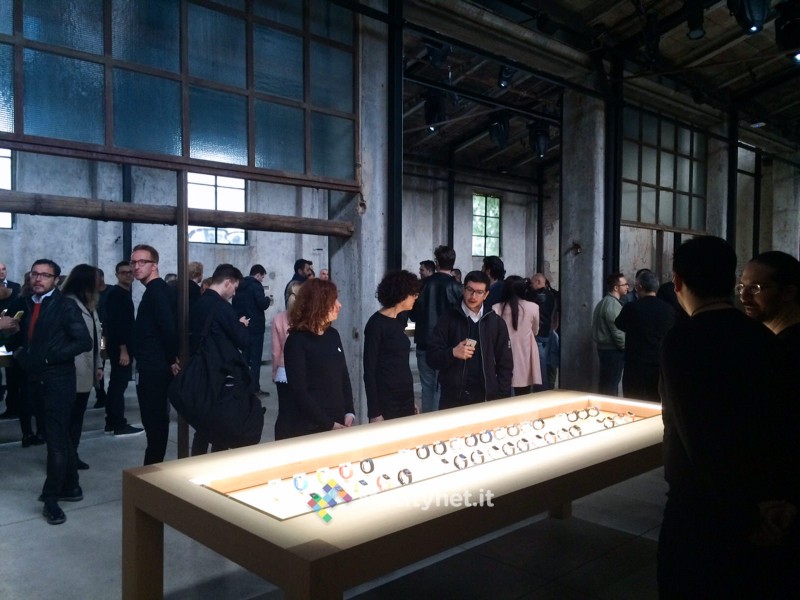
Camera Technology
- Staying ahead in smartphone camera technology in the race to DLSR equivalence requires a combination of top engineering resources and long-term strategic investment. Apple’s acquisition of Israeli camera startup LinX is a good example of the latter. LinX have some interesting multi-aperture tech that supports among other things 3D image capture. The initial fruits of the takeover are likely to be more evolutionary than revolutionary though:
“the big advantages of the multi-aperture design for the iPhone maker are probably around producing the best results in terms of low light, HDR and color fidelity with general, everyday picture-taking.”
- For another innovative take on 3D and cameras, The Verge profiled a prototype camera capable of charging itself that was built by a research team from a combination of COTS components and 3D printed parts. It’s pretty basic but a proof of concept nonetheless that a camera sensor and solar panel can effectively be interlaced:
“When exposed to light, the camera’s sensor toggles between capturing an image and charging the power supply. It works well enough to capture one image per second, but it has a tiny resolution of just 30 pixels by 40 pixels (that’s .0012 megapixels, for those of you keeping count). “
Google and Android
- In an important development following a five-year investigation Google have been charged with monopoly abuse by EU watchdogs “over the way it promotes its own shopping comparison service in general web search results.” According to John Naughton in the Guardian, it’s further evidence of “the radical differences that are emerging between European and American attitudes to internet giants” and add to growing suspicion of the impunity with which the GAFA outfits operate. However in his view too little too late – Google are already untouchable:
“Dominance of internet search confers on the company the ability to determine who is visible (and who is invisible) in a networked world, which is why the so-called “right to be forgotten” is such a misnomer. It’s actually a right not to be found by a Google search.”
- It’s an irony that won’t be lost on Microsoft who are among those lobbying for sanctions on Google. In another remarkable mobile industry twist that really hits Google where it hurts, Microsoft have announced a partnership with alternative Android ROM vendor Cyanogen:
“[The move] will see Cyanogen integrating and distributing Microsoft apps like Microsoft Office, OneDrive, Outlook, Bing, OneNote, and Skype among others, into their devices. This will run straight up against Google’s mobile apps, which has normally “dominated” most Android-based smartphones and tablets, a fact that isn’t lost on their critics and competitors.”
- Google would much rather concentrate on good news stories so here are a couple. First up you’ll now be able to Google “Find my phone” to locate your missing Android smartphone. It will be a lot easier than finding Android Device Manager first.

- And popular password management tool LastPass has received a Material Design update for Android with improved navigation:
https://www.youtube.com/watch?v=Nn-viIGQSsM
Apps and Services
- The extent of the effort Facebook has put into becoming the global number one OTT Messaging giant is evident from this recent OnDevice presentation surveying the state of mobile “Social Messaging”. China and Japan are resisting due in large part to local preferences but pretty much everywhere else Facebook properties (specifically Facebook itself, Messenger, WhatsApp and Instagram) have surged to dominance:
- The deck also highlights how social messaging is now a more popular communication channel than SMS, voice and email:
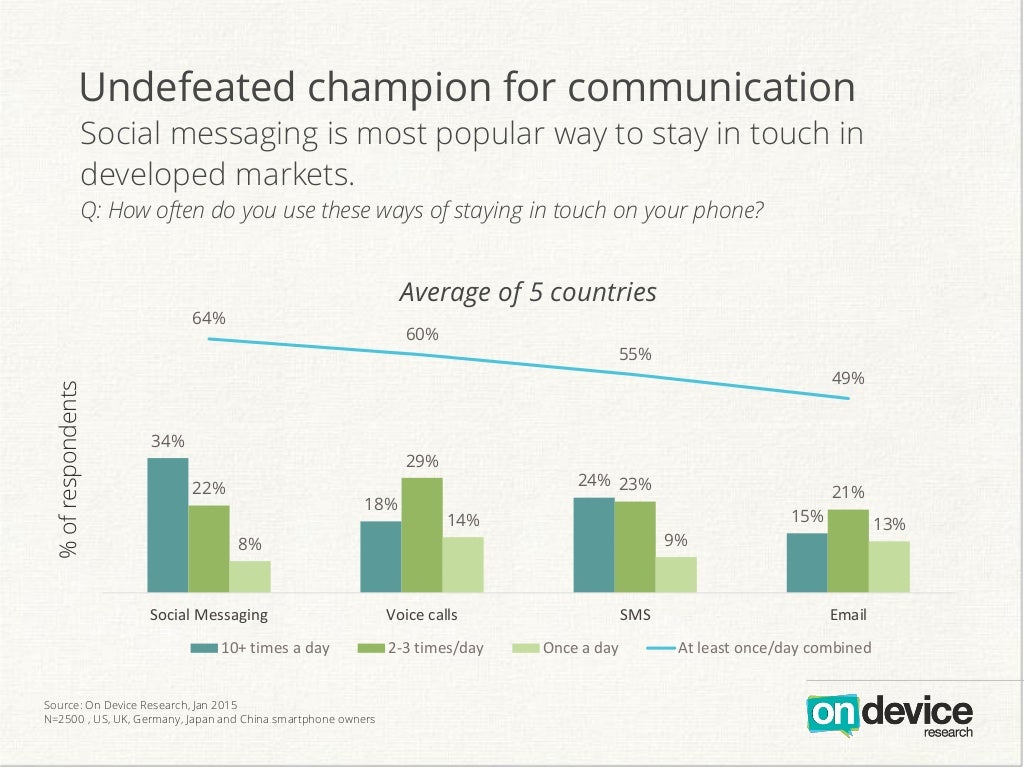
- Slack is the poster boy of Enterprise OTT Messaging and their wildly popular team communications proposition has been covered many times in this blog in the last year. According to the NYT, it’s the “fastest growing business application of all time“. Nonetheless it seems incredible to think it might be worth the $2.8 billion that reflects the most recent investment round given the type of business mediation product it offers. CEO Stuart Butterfield provides this gnomic assessment on proceedings:
Q.So do you think Slack is worth $3 billion?
A.It is, because people say it is.

- Not long ago, DataSift was riding to global relevance on the back of the news that they had apparently being given the keys to Facebook’s kingdom. That upward curve is still possible but certainly much more challenging this week following the revelation that Twitter are cutting access to their firehose presumably to enable them to build their own monetizable proposition. It’s yet another reminder that if you build on the likes of Facebook and Twitter APIs you cannot assume benign partnership is a given. You will expose yourself to “platform risk” as was highlighted in the blog a couple of weeks ago. DataSift CEO Nick Halstead tried to put as brave a face on the turn of events that he could.
- Tidal are pushing on with Jay Z apparently sitting in on customer service calls to personally thank a few lucky users and the announcement of an “easy playlist transfer” feature:
Thanks to a partnership with Soundiiz, you can bring over saved playlists from Deezer, Rdio, Spotify, Xbox Music and more. … Select the services where you’ve saved the curated lists, and then a drag and drop interface allows you to place them with the new choice.

Cloud, DevOps and Microservices
- The London Amazon Web Services (AWS) Summit took place this week at Excel. It was a somewhat overwhelming experience with reports on the ground of over 8000 attendees for an event at which only 3000 were originally envisioned. It was impossible to get into many of the technical tracks due to overwhelming interest. Here’s a partial view of the sight of the audience that greeted your host on arrival at the morning keynote. A visible demonstration of the role of AWS as a primary reagent for cloud-based change for a growing number of startups and SMEs:
- Amazon CTO Werner Vogels gave the keynote with help from a variety of industry leaders who toed the Amazon line. InfoQ provided a good summary of Vogels’ nine patterns of cloud adoption. Within the sessions themselves, highlights included talks on Amazon Machine Learning and Elastic File Store. Here are some raw impressions taken at the event:
EFS (Elastic File Store): High availability, managed + securable, elastic NFSv4 file storage in the cloud “NAS-killer”, SSD-backed, $0.30/GB/month which equates to about $3.6k/TB/year. Enterprise NAS vendors like Synology will be worried.
AML (Amazon Machine Learning): Train and exploit simple predictive models built from csv data import without having to “know” about ML. The tool although limited will see significant take up because it essentially brings supervised learning into reach for the non-ML tech masses that use AWS. A variety of “csv in the cloud gap filler” propositions like import.io, stoic.com, BigML or even (to a certain extent) Splunk will be somewhat worried. Under the hood AML is built on and choreographing EMR resources.
- Vogels mentioned DevOps numerous times. DevOps is a mindset revolving around automation, transparency and talent. Another InfoQ post provides a high level introduction and provides a helpful definition from one of the founders of the movement:
DevOps is the organizational mindset that enables continuous delivery – a focus on everybody working together to improve development performance measures such as throughput while at the same time increasing stability and reducing mean time to restore service.
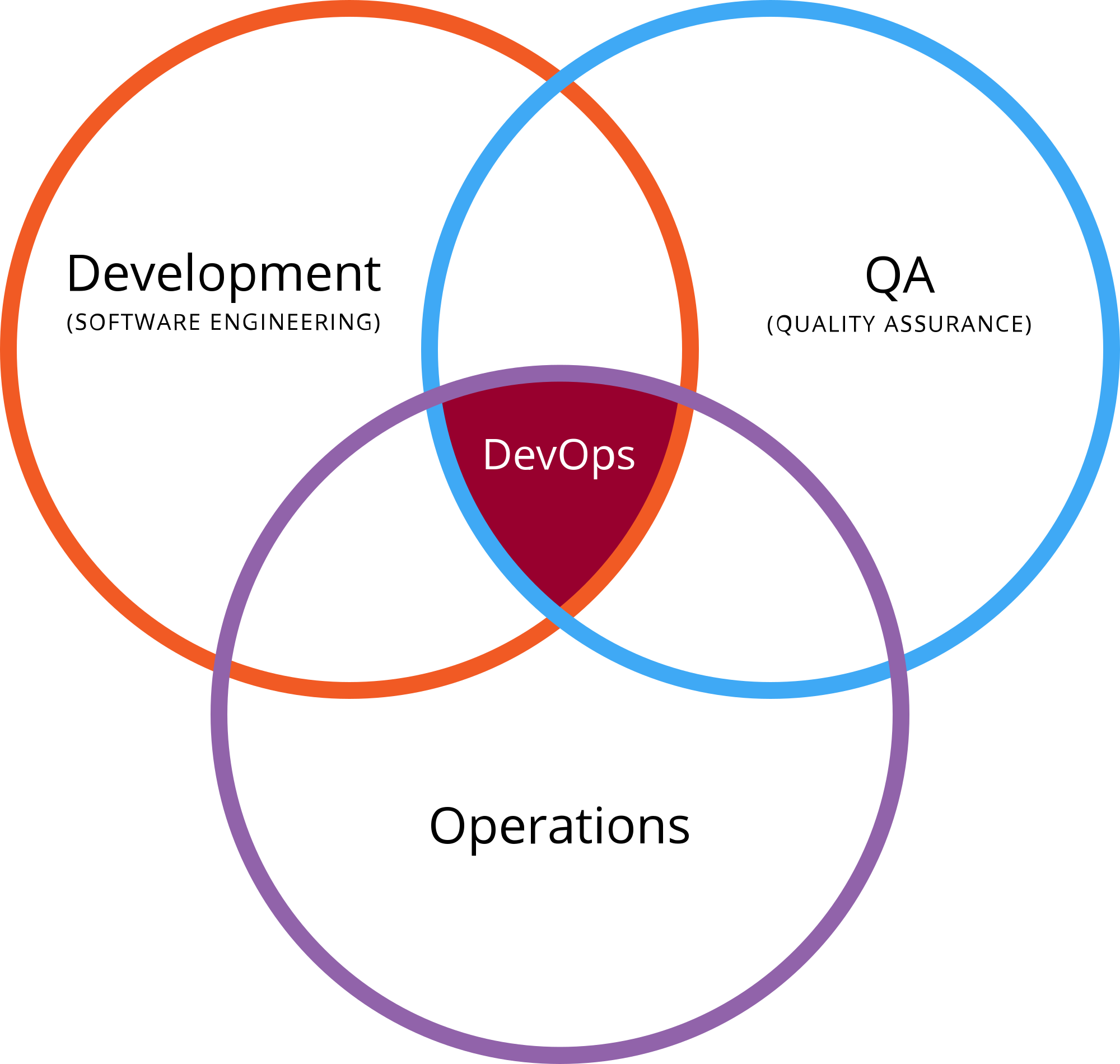
- InfoQ also published this interview with Adrian Cockcroft in which he underlines how much the Enterprise landscape has changed over the last few years. Traditional big company environments are increasingly finding themselves embracing microservices, polyglot development, devops and agile because:
[It] turns out you actually can get more done with the same or less people, and you’re delivering products to customers that they like better and you’re typically doing it faster than your previous teams could.
Big Data
- A key driver of change has been a dramatic increase in the volume of unstructured data hitting the typical Enterprise infrastructure. According to CapGemini “existing information systems are often suitable for historical reporting but they lack the ability to deal with predictive analytics, unstructured data and the sheer volume of data sets.” Any remaining SMEs out there that don’t get it and can’t see a need to adapt are likely to be overrun by those that do.
- A good example of why new tools and thinking is needed comes courtesy of Splunk’s entry-level education material. It helps explain to non-technical stakeholders why it is so important to be joined-up across the modern enterprise to address customer service issues as effectively as possible. Their use case example involves the purchase of a smart device but it could be literally any FMCG:
- Splunk is one of the best kept secrets of Enterprise “operational intelligence” as it is often termed, the generation of vital business insight from unstructured machine data. They’ve just launched a PAYG hosted Splunk Cloud proposition available via AWS Europe at volumes up to 10TB+/day. This will probably make Splunk an even more compelling proposition within many SMEs.
- This handy Tableau white paper covers use cases for different graph visualisations from stacked bar graph to pie chart. Note that you have to register to download it.
Security
- Another day, another keyless fob exploit covered by the NYT this time involving a power amplifier and what appears to be $30 of COTS kit. As cars increasingly morph into computers on wheels, robust electronic security is inevitably becoming more of a concern for auto OEMs.
Wearables and Hardware
- Hackaday on an even smaller wearable computer “for ants” called the Micro Mote 3 which is just the size of a grain of rice. Developed at the University of Michigan in the US, here’s a picture of it sitting on a coin. The lower stack diagram outlines what’s inside.


- NailO is a thumbnail sized Bluetooth trackpad that you wear on your thumbnail and use to scroll your smartphone screen:
- Minecraft gameband wearable allows you to wear your worlds with you:
https://www.youtube.com/watch?v=nfg_tH4ZKIs
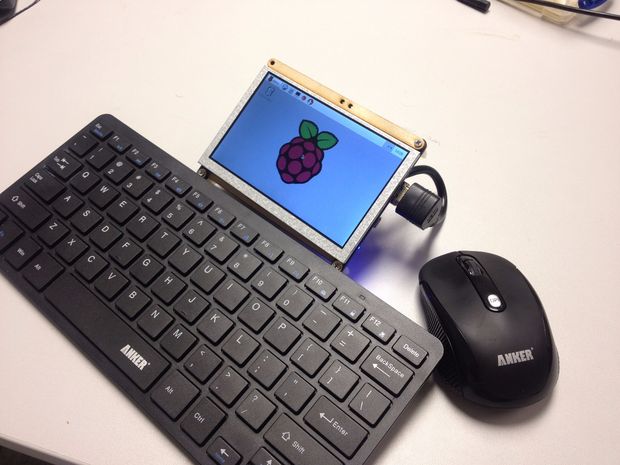
Marketing
- An extraordinary 20 year old Pepsi document stumbled across this week invokes the golden ratio, yin and yang oppositional forces, and er, relativity. If you’ve ever harboured suspicions about marketing, they are unlikely to be assuaged by this tour de force which appears to have been constructed with the aid of something slightly stronger than sugar water. A small taster:
Software Engineering
- The StackOverflow Developer Survey for 2015 is essential reading for anyone working in mobile development. It provides a fascinating picture of StackOverflow users ranging right across demographics and compensation to working technology stack and is full of arresting observations:
“At the time of this writing, the average developer is 28.9 years old. He or she was born in April 1986, just as IBM manufactured the first megabit chip.”
- One of the graphs highlights hot technologies from a remuneration perspective – this is what it pays to know y’all:
Culture and Society
- The inclination to blog is being “killed” by increasing use of celebrity screenshorts. These involve taking a screenshot of the text for a post and submitting as an attachment to Twitter which is seen as a particularly potent method of communication to those with a lot of followers. Why?
“because it’s an easier and more authentic way to reach your fans, friends or followers directly on social media than it is to spend time setting up a blog and then sharing out the link.”
- Apparently typing notes is less effective if you need to later recall them than simply using a paper and pen:
“A recent study published in Psychological Science found that the pen is mightier than the keyboard when it comes to remembering what you just jotted down.”
- Terrific review of Enlightenment 2.0 asserts that Modern Capitalism is “making us stupid” in part by being able to “exploit every bug and shortcut that nature has built into the human application program interface (API)” like a laser-guided attacker. We are powerless to resist without serious conscious effort:
“The sheer amount of cognitive effort required to navigate a modern environment without being suckered has increased dramatically”
Lifehacks
- One way to lessen your cognitive burden is to never check your email before noon. That insight along with other tips for reducing mental drag are explored in this TNW post:
“The best way to avoid mental drag is to give yourself the time and space to do important work before distractions can creep into your day.”
- A LinkedIn post along similar lines suggests that successful people “work less at weekends” and recommends you should too and focus your energy on other activity to improve your overall productivity.
- On the subject of prioritising energy over time, NYT suggest the right dose of exercise for a longer life is a large dollop of moderate exertion with a more vigorous topping. Anything more than that may not make that much difference:
“Anyone who is physically capable of activity should try to “reach at least 150 minutes of physical activity per week and have around 20 to 30 minutes of that be vigorous activity””
- And while we’re at it, why restraint and self-control are worthy of encouragement:
“Childhood self-control was still a significant predictor (of unemployment) after we controlled for variation in intelligence, social class, and an extensive range of family and health factors.”
- Not taking any career risks is the riskiest career move of all because there is no such thing as job security for most people any more. You risk ending up with irrelevant skills in a market that’s moved on. The optimal strategy to adopt should be WTTMSW or “whoever tries the most stuff wins”. The forces ranged against you are strong though:
“we are wired to resist giving up the known for the unknown. None of us tolerates ambiguity well — particularly when the losses and gains underpin our livelihoods or the projected long-term happiness of our families.”
